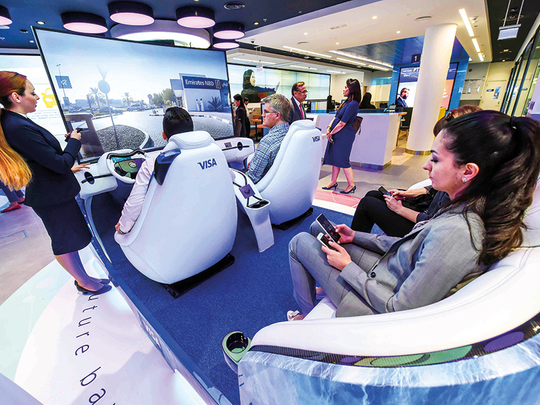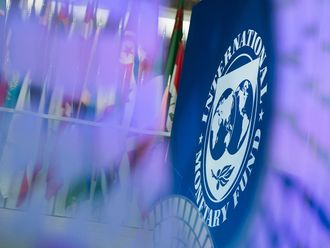
Dubai: Emirates NBD delivered a strong set of results at the end of the third quarter of 2017, with net profit up 15 per cent to Dh6.17 billion, even as the banking sector in the country continued to face a relatively tough operating environment.
The bank reported a total income of Dh11.4 billion for the first nine months of the year with retail revenues posting robust growth. Revenues of the Retail Banking and Wealth Management division as of end-Q3 are up nearly 11 per cent, ahead of most peer banks, on the back of continued strong current and savings accounts (CASA) growth and fee incomes from the wealth management, foreign exchange and cards businesses. “Our profits had an even stronger growth, further strengthening our position as the most profitable retail bank in the UAE with the lowest cost-income ratio and highest CASA ratio,” Suvo Sarkar, Senior Executive Vice-President, Head of Retail Banking & Wealth Management told Gulf News in an interview.
While the overall retail loan book has been flat for the year in line with the market, the bank has seen strong growth on its mortgages portfolio, led by robust acquisition. The credit cards book continued to grow well on the back of double-digit spend growth, especially on its marquee co-branded cards such as Skywards, SPG, dnata and Manchester United.
In the small- and medium-sized enterprise (SME) business, where the bank enjoys a market share of 25 per cent, it is focused on prudent growth through a mix of secured and unsecured lending, both for working capital and trade finance. The personal loans and auto loans businesses have been slow for the industry, and in these two products, the bank is increasingly focusing on growing market share through innovation and digitisation.
“The outlook for 2018 is cautiously optimistic,” said Sarkar. “The economy is looking to get a fillip with initiatives such as the Expo 2020, of which we are a premium partner, gathering momentum. While there are moderate head winds such as continued sluggish liquidity and the introduction of VAT [value-added tax], which may temporarily slow down retail spends, the overall outlook is bullish with tailwinds from rising interest rates,” he said.
The overall market for consumer loans is expected to remain flat. The market has to factor in the impact of the new VAT, which might slow down consumer spending. However, Sarkar expects with preparations for Expo 2020 gathering steam, banks are likely to gain from moderate tail winds for both individual and SME lending.
Amid the slow growth environment, the bank plans to leverage on its ability to meet customer expectations to drive business volumes in consumer loans. “At Emirates NBD, our paperless loans initiative enables customers to sign up in less than ten minutes for loans completely digitally without signing or providing a single piece of paper. Currently 60 per cent of our personal loans are paperless,” said Sarkar.
Deposit growth in the banking sector has been constrained by liquidity pressures in the market and low growth in the low single digits over the past year. He expects the trend to continue to be sluggish in the near term given the political and economic headwinds the region is facing. However, he expects Emirates NBD to continue to grow its liabilities market share, from the current 24 per cent.
On the assets side, the bank is benefiting from improving asset quality. Delinquencies and loss provisions have been improving steadily for both the consumer banking and SME banking sectors. The consumer sector has benefited from the Etihad Credit Bureau and the SME sector has benefited from more prudent underwriting by lenders. For sure, the new vintages in both these sectors are of a significantly better quality and the bank expects to see lower loss rates in coming years.
Banks will have to learn to leverage the rich data now available from AECB. Emirates NBD was the first bank to launch risk-based pricing and documentation: the higher a customer’s credit score, the lower the pricing and simpler the documentation.
Fee income to be a key driver
Fee income has been a key driver of profitability this year and the bank expects strong growth to continue in this revenue stream. “We see fee income growth coming from three areas: wealth management, foreign exchange and cards. On wealth management, we have seen very strong net new money flows for both the high net-worth and mass affluent customer segments,” said Sarkar.
Private banking and priority banking assets under management and revenues are both witnessing double digit growth. Mutual funds, bonds, insurance products, REITs [real estate investment trusts] and structured products are increasingly supplementing traditional savings options for customers. The bank’s foreign exchange revenues are growing strongly supported by SME business franchise and retail FX sales across the bank’s branch network.
The bank offers its business customers a wide range of FX products, starting from simple spot and forwards to derivatives and options. Its remittance programme, DirectRemit, continues to grow at a fast pace with the number of transactions doubling over the previous year across six remittance corridors and the newly launched GlobalCash FX prepaid card with a wallet for 15 currencies has seen huge acceptance from the bank’s customer base who travel regularly for business or pleasure.
As the new VAT regime kicks in, Sarkar expects to see a few months of settling-in time as customers and businesses adapt to the new structure. This could slow down consumption and top line growth. “VAT on fees will be collected from customers and passed on to the tax authorities as per applicable banking industry guidelines. In the medium term, overall impact on retail profitability is expected to be minimal,” said Sarkar.












